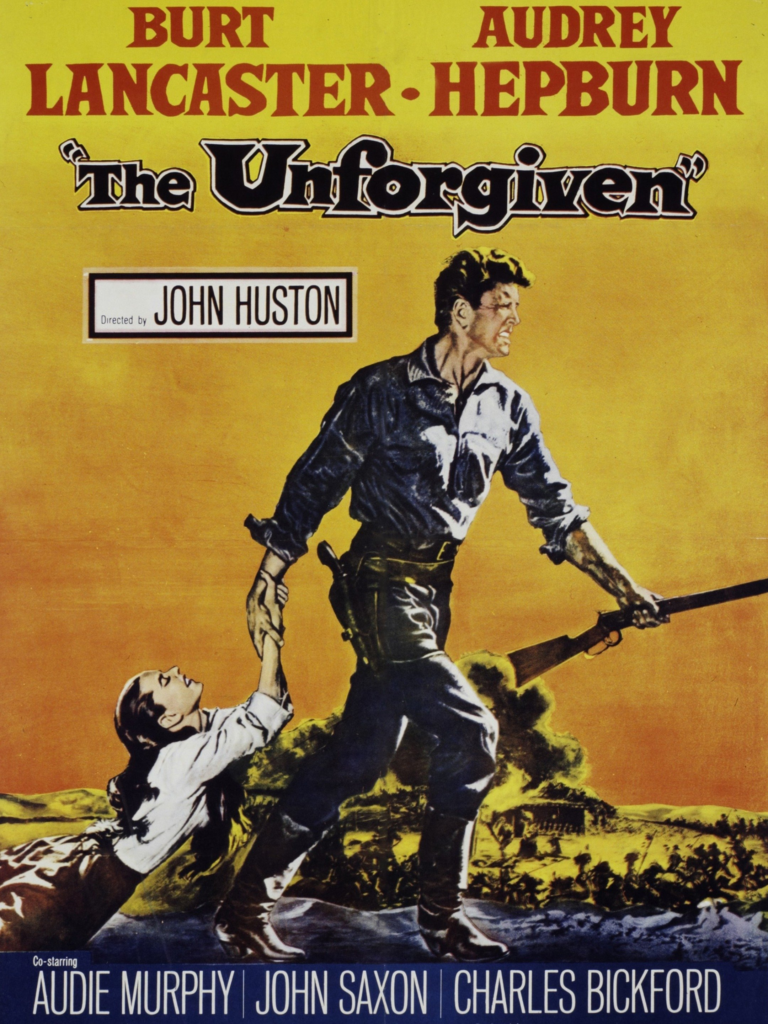
UNFORGIVEN, THE
(director: John Huston; screenwriters: from the book by Alan LeMay/Ben Meadow; cinematographer: Franz Planer; editor: Russell Lloyd; music: Dimitri Tiomkin; cast: Burt Lancaster (Ben Zachary), Audrey Hepburn (Rachel Zachary), Audie Murphy (Cash Zachary), Doug McClure (Andy Zachary), John Saxon (Johnny Portugal), Charles Bickford (Zeb Rawlins), Lillian Gish (Matilda Zachary), Albert Salmi (Charlie Rawlins), Joseph Wiseman (Abe Kelsey), Kipp Hamilton (Georgia Rawlins), June Walker (Hagar Rawlins), Carlos Rivas (Lost Bird); Runtime: 122; MPAA Rating: NR; producer: James Hill; MGM; 1960)
“Considering how Huston and Lancaster have artistic disagreements over filming, it surprisingly still turned out relatively well.”
Reviewed by Dennis Schwartz
John Huston’s social conscience Western, exposing the ugliness of racism, is set in the Texas Panhandle sometime after the Civil War in the 1860s. It’s based on the book by Alan LeMay, who wrote the novel The Searchers was based on. The Unforgiven is not only a study of racism — the orphan Audrey Hepburn lives with the white ranchers who adopted her but is suspected of being an Indian — but a salute to the pioneers of the Old West. As poorly executed, unconvincing and ludicrous as is the storyline, there’s still a fascination in the sweeping gestures of Huston’s treatment of prejudice–something I might add few films at that time ever attempted to get at.
While Rachel Zachary’s (Audrey Hepburn) three brothers, the patriarchal Ben Zachary (Burt Lancaster), the bigoted Cash (Audie Murphy) and the virgin nice-guy Andy (Doug McClure), are about to return from a long cattle drive, sis frolics on horseback on the isolated desert ranch while her homemaker adopted mom Matilda (Lilian Gish) bakes bread at home. The peace is broken when an ornery one-eyed white man, Kelsey (Joseph Wiseman), quotes from the Bible a verse about vengeance after riding near Rachel while sporting a saber and frightening the young lady with his presence. We soon learn that he’s spreading rumors throughout the community that Rachel is an Indian, and has hatred in his heart for the Zachary family (we will learn later that the Indians killed Kelsey’s son and later killed Will Zachary, Matilda’s hubby, who before he died saved the life of the only survivor from a slaughtered Kiowa camp and gave the baby girl to Matilda to raise as a white child–saying he wanted no more bloodshed).
Some of the whites begin to believe Kelsey’s tale is true and turn their backs on the Zacharys; while the Kiowa send Rachel’s brother, Lone Bird, to peacefully bring her back to her people by swapping horses for her. Things get ugly when Ben’s ranching partner, Reverend Zeb Rawlins (Charles Bickford), learns his son Charlie (Albert Salmi), Rachel’s suitor, is killed by the Indians. This leaves Ben no choice but to go after Kelsey and wring the truth out of him. Ben’s men capture Kelsey and before they hang him, they make him swear to tell the truth. But Kelsey doesn’t change his story. Zeb believes him and tells Ben he will dissolve their profitable cattle partnership unless Rachel is returned to her people. But Ben refuses to return his sister and then must fight off, without the help of his white neighbors, a savage Indian attack to take Rachel back.
Things got muddled along the way of this well-intentioned message film, as the film’s strong sentiments against racism seem countermanded by portraying the Indians in a stereotypical role. Yet Huston keeps out the preaching, letting the story play out its violent course in an action-packed climax. Considering how Huston and Lancaster have artistic disagreements over filming, it surprisingly still turned out relatively well. Lancaster’s company produced it and were gunning for big box office, while Huston was drawn to the project because of the racial intolerance angle on the frontier intrigued him. In the end, Huston distanced himself from the film and later claimed that “of all his films, The Unforgiven was the only one he actually disliked.” Which only proves that sometimes the director isn’t the best judge of what he created.

REVIEWED ON 1/18/2005 GRADE: B https://dennisschwartzreviews.com/